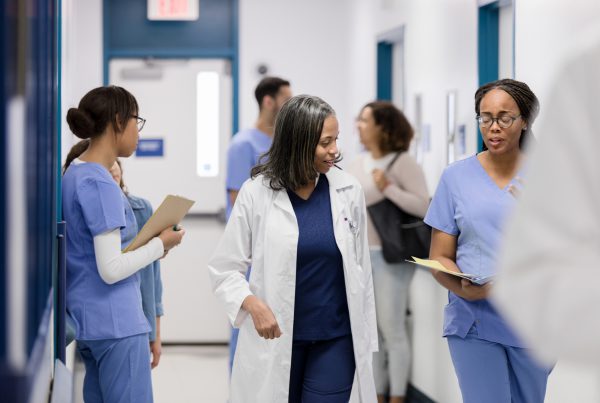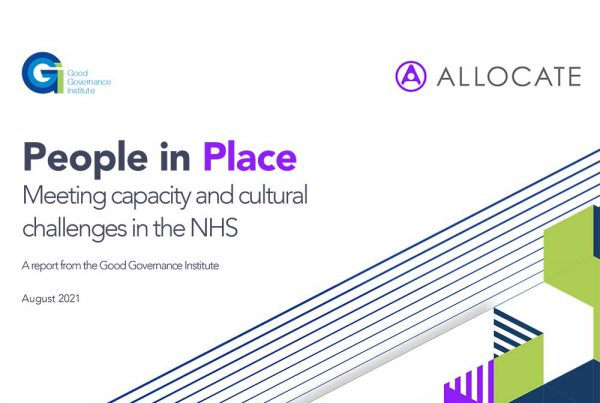Shona Blackhall, Product Manager, Allocate Learning & Development, writes:
Last year, the TOPOL Review highlighted the need to prepare the healthcare workforce for a digital future. It identified a need for education and training to equip employees with the ability to achieve their full potential in what is a technologically evolving and improving NHS. But how, when many organisations do not have the infrastructure, processes or culture, can they effectively support this digital way of working? The solution requires a top down and bottom up approach which extends far beyond just learning and development.
While tech advancements such as ePortfolios, global collaboration sites, e-mentor support and Massive Open Online Courses (MOOCs) are an increasingly familiar part of today’s education system, industry itself is playing catch up, creating a mismatch between young talent and their future workplace. Couple that with the fact that the existing NHS workforce is aging with varying levels of digital literacy, and a challenging balancing act presents itself.
It is clear that the sector must adapt in line with the recommendations of the TOPOL Review, however, there are also major gaps in basic digital knowledge across the existing workforce. An efficient and effective programme of upskilling must therefore be undertaken in order to train those non-digital natives and bring them to a point where they are able to confidently enter a new era of digital medicine, including genomics, AI and robotics, which together, will change the roles and functions of clinical staff over the next 20 years.
Evolution of personalised learning management systems
With such a diverse workforce with varied training needs, traditional Learning Management Systems (LMS) are already expanding, moving away from simply recording learning achievement towards ‘Learning Experience Platforms’. This new approach provides a personalised learning experience, typically based on defined criteria such as job role or career path.
These learning management systems will become increasingly important when considering the impact of skills shortages and Brexit on the NHS workforce. High demands on the service means technology must effectively capture informal, bitesize learning opportunities, as well as more formal training, in order to make the best use of staff time and resource.
Although these systems are embryonic, as Artificial Intelligence (AI) and Machine Learning (ML) algorithms get better at suggesting what an individual might need or want, they will become increasingly powerful.
Digitally empowering healthcare pros
Developments in genomics, AI, digital medicine and robotics will drastically change the roles and functions of clinical staff to ensure safer, more productive, more effective and more personal care for patients. As such, education providers must deliver a new approach to learning and development that empowers current and future healthcare professionals to understand the possibilities of digital healthcare technologies and the corresponding ethical and patient safety considerations.
These programs of the future should ensure students gain appropriate levels of digital literacy while offering opportunities for students to intercalate in areas such as engineering and computer science to deliver improved care and productivity within the NHS.
Challenges and opportunities in digital healthcare learning and development
Individuals will begin to take ownership of their online learning journey and the technology to enable this, leaving the boundaries of corporate LMS behind. Whether that’s through apps, wearables or entry points as yet unknown, the learning people consciously and subconsciously absorb throughout their lives will become an integral part of the digital learning journey. Trackable, interrogatable and defined by personal goals, desires and experiences.
Similar to individuals who have ownership of their fitness journey through a range of apps and devices, NHS and healthcare staff will have the opportunity to ‘own’ their learning data.
Employers will request access to some of that data and add to it by providing formal and informal experiences and opportunities for learning, improving the richness of the individual’s profile.
The LMS will enable the employer to hold the data that’s required by them to understand their organisation’s skills profile, but it will only be a small part of the rich data the individual holds on themselves.
Moving away from qualifications and towards competencies
While many of the medical and surgical skills needed in the NHS will remain the same, there are some, especially medtech skills, that are currently unknown. Employers need to be prepared, so identifying an individual’s abilities and competencies rather than qualifications is becoming increasingly important.
While an employer cannot possibly know what skills profile they will need when they don’t yet know what skills of the future will be required, identifying personality traits such as curiosity, aptitude, flexibility and adaptability that mirror the people profile your organisation looks for is key. Using technology to interrogate that data to find suitable nurses, doctors, clinicians and healthcare professionals will mature, as tools and algorithms for identification improve.
Technology Enhanced Learning
While modern methodologies of pedagogy are still relevant, how we access learning continues to change.
Technology Enhanced Learning (TEL) can be useful in providing scalable education across the NHS. Using a blended approach to learning, combining TEL with face-to-face experiences, can provide the essential mixture of social, emotional and physical elements of learning. TEL can mature from a generic ‘one-size-fits-all’ model to a personalised and adaptive experience through data analysis of learners, their actions and their context using AI.
Furthermore, the speed at which Augmented Reality (AR) and Virtual Reality (VR) is improving and becoming accessible and affordable means that the classroom walls are being removed. AR and VR opens up a world where we can meet and communicate in real time, in an environment which feels so comfortable you are able to converse as if you were in the room together, seeing facial expressions and body language which enable you to build a relationship and provide a conducive learning environment.
Although the technology is already being used in healthcare, its usage remains niche. As barriers to entry are lowered and the technology improves, we will see this type of training become the norm. Consequently, trainers will need to adapt their skills to this evolving learning environment to ensure whatever the delivery method, the individual’s learning outcome is outstanding.
From telemedicine and interventional and rehabilitative robotics to sensors and wearables for diagnostics and remote monitoring, health technology continues to evolve. It’s therefore critical for healthcare learning and development to grow with it, while plugging the significant gaps in digital competency in the aging NHS workforce.
Only when an individualised learning and training programme for all healthcare staff has been initiated will the observations of the TOPOL Review really begin to manifest themselves in a digitally responsive NHS.
To find out how Allocate’s DevelopMe+ LMS solution is helping learning and training departments throughout the healthcare sector, join one of our upcoming webinars around engaging staff and making a difference. Click here for more information or email [email protected].
Webinar
Join us for our webinar with Southern Health NHS Foundation Trust on 31 March at 9.30am, to learn about how they have used their learning management software (LMS), Allocate DevelopMe+ across their 6,500 staff to manage their statutory, mandatory and developmental training via clinical, professional or managerial courses.
[simple-author-box]





